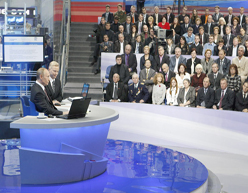Economic crisis-related issues dominate Putin’s annual live-call-in Q&As show

Russian Prime Minister Vladimir Putin has continued his annual live-call-in Q&As program, the relatively new Kremlin's interactive TV political tradition he established during his presidency, where he usually gives comprehensive answers to direct questions from the citizens all over the country. "The main goal of this direct link-up with the people is for the prime minister to get feedback on his government’s policies directly from the citizens,” Dmitry Peskov, the press-secretary of the Russian prime minister, said.
Indeed, today’s session, which lasted for 3.08 hours, featuring over 1.5mln phone calls, 600,000 SMS-delivered messages and equally staggering numbers through a specially created Internet portal in the first two hours of the live Q&As show, was not much different from the previous sessions during his eighth presidency. However, unlike the previous programs, this year’s show was overshadowed by the current economic crisis, which featured prominently in the questions sent by the majority of the callers, worried over their jobs and rising costs of standards of living, increasing threats of foreclosures on mortgaged assets as commercial banks unilaterally alter lending conditions or tightening them for granting new loans against the backdrop of liquidity squeeze, etc.
The other two notable exceptions in this year’s Q&As were the facts that it was Putin’s first in his new capacity - both as the nation’s prime minister and the leader of the powerful United Russia, the State Duma majority faction, and hence, the nation's ruling party, and also the fact that the venue was shifted from the Kremlin, now occupied by the incumbent president, Dmitry Medvedev, to Gostiny Dvor, the 17th century architectural masterpiece, just a few steps from the Red Square in central Moscow. The central hall in this property was temporarily transformed into a TV studio, equipped with the latest gadgets in the industry, to host the program. In all, Putin answered 72 questions from the overall total of 2.2mln calls that came through during the Q&A by phone, SMS and Internet.
Thematically, these questions usually cover all aspects of domestic and foreign policies, while Putin’s often elaborate and statistics-laden answers usually translate into radial future changes to key existing state policies or into calls for the government to adopt new ones. It was almost the same this year, as the prime minister fielded questions on the crisis and Russia’s potential to overcome the global economic crunch unharmed, the fate of the ruble and its future perspectives, the Georgian aggression and the fates of South Ossetia, the direct object of the aggression and Abkhazia, the breakaway republics, whose sovereign independence from Tbilisi were recognized by Moscow in summer at the peak of the crisis. Other questions covered the declining social securities, namely wage arrears and pensions, the ongoing constitutional amendments to the presidential term, the relationships with the United States under Barack Obama, etc.
Thus, fielding the questions on the U.S.-Russian relationships, Putin noted that Moscow is seriously interested in improving its ties with Washington and would welcome all initiatives aimed at establishing a productive dialog that will be based on mutual respect for each other’s interests. “We have heard about the necessity to build relationships with Moscow based on respect for its interests,” Putin said. “If these are not empty rhetoric, and these wishes will be translated into practical polices, then, our reaction will, of course, be adequate, and our U.S. partners will quickly feel this,” he added. “Usually, when there is a change in political leadership in a country, more so in a superpower nation such as the United States, some changes do take place. We really hope that such changes will be really positive ones.”












 Web design,
Web design,